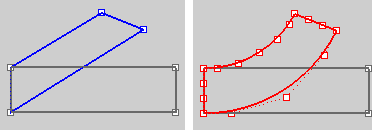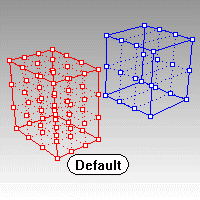CageEdit
| Toolbar | Menu |
|---|---|
|
|
Transform Cage Editing > Cage Edit |
The CageEdit command deforms objects smoothly using two-, and three-dimensional cage objects.
Note
- Cage editing allows smooth deformation of surfaces with dense cage control points.
- Polysurfaces are not broken apart at the seams by CageEdit deformation.
- CageEdit allows both overall deformation and partial deformation of an object.
- The control object can be made with the Cage command or can be an existing surface or curve.
- To use the captive object as its own control, select an edge of same object or a face of a polysurface.
- History is built in regardless of the History setting.
Steps
-
Select the captive objects (objects to edit).
-
Select or create a control object, which defines the region to edit.
-
Edit the cage points of the control objects.
| Options for cage control object | |
|---|---|
|
Uses the object bounding box to determine the box location. See the BoundingBox command for detailed option descriptions. The Cage Points option specifies the number of cage control points and degree of the cage in each direction as appropriate for the cage object. PointCount (XYZ)Specifies the number of cage control points in each direction of the line, rectangle, or box. Degree (XYZ)Specifies the degree in each direction of the line, rectangle, or box. |
|
|
Line |
Draw a line to be used as the control object. DegreeThe degree of the line. PointCountThe number of cage control points. |
|
Rectangle |
Draw a rectangle to be used as a control object. See the Rectangle command for detailed option descriptions. Degree (XYZ)Sets the degree of the surface in the u and v directions. PointCount (XYZ)The number of cage control points in the u and v directions. |
|
Box |
Draw a box to be used as a control object. See the BoundingBox command for detailed option descriptions. Specifies the number of cage control points and degree of the cage in each direction as appropriate for the cage object. PointCount (XYZ)Specifies the number of cage control points in each direction of the line, rectangle, or box. Degree (XYZ)Specifies the degree in each direction of the line, rectangle, or box. |
|
Deformation |
AccurateMakes the deformation slower to update and may result in denser surfaces when deformed objects are refit. FastCreates surfaces that have fewer control points and are therefore less accurate. |
|
PreserveStructure |
Specifies whether the control‑point structure of a curve or surface will be maintained after the deformation. The PreserveStructure option does not apply to polysurfaces, and will not be displayed if polysurfaces are selected for editing. YesPreserves the control‑point structure of the surface. Deformation may be less accurate if there are too few control points in on the object. NoRefits the objects as needed with more cage control points to allow accurate deformation. 
PreserveStructure=Yes (left); PreserveStructure=No (right). |
|
Region to edit |
GlobalDeforms objects throughout 3‑D space. The influence of the control object on the captives is not limited to the region inside cage objects or adjacent to control curves or surfaces. Objects that are only partly contained in cage objects are still deformed throughout. The influence of control objects is greatly magnified the farther captives are outside them. LocalSpecifies a Falloff distance from the control object to surrounding space. Captives or parts of captive objects that fall outside the falloff distance are not deformed. Falloff distanceControls where the cage edit is applied and controls the size of the region between the region with full effect and the region with no effect. Three regions control editing:
|
|
Other |
Define a sphere, cylinder, or box that limits the influence of the control object over the captives in space. Specify a Falloff distance. |
| Toolbar | Menu |
|---|---|
|
|
Transform Cage Editing > Create Cage |
The Cage command creates a box-shaped cage object to be used with the CageEdit command to deform other objects.
Note
- Cages with a small number of cage control points can modify more complex objects. This ensures that transitions are smoother than could be achieved using standard control point editing.
- After creating the cage object, use the CageEdit command to capture objects with the cage. Use the cage's control points to deform the captive objects.
Steps
- Select objects, and press Enter.
See the Box command for option descriptions. - Draw the cage box.
| Command-line options | |
|---|---|
|
See the BoundingBox command for detailed option descriptions. |
|
|
Diagonal |
Draws the base rectangle from two diagonal corners. No option for side length is offered.
|
|
3Point / Vertical / Center |
See the Rectangle command for more information. |
|
Coordinate system |
CPlaneWorld3Point |
|
Cage points |
Specify the number of cage control points and degree of the cage in each direction as appropriate for the cage object. PointCount (XYZ)Specifies the number of cage control points in each direction. Degree (XYZ)Specifies the degree in each direction. |
| Toolbar | Menu |
|---|---|
|
|
|
The ReleaseFromCage command removes selected objects from the influence of a control object set up by the CageEdit command.
Steps
- Select objects.
Note
- The Explode command will change a control object into normal geometry.
- The SelCaptives command selects all of the objects that could be released.
See also
SelControls
Select all cage controls.
SelCaptives
Select captive objects of a specified cage controls.
